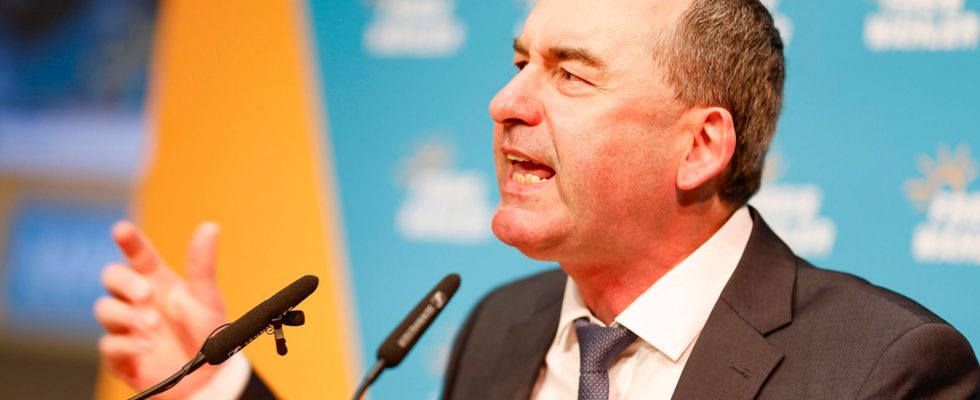Was it really Helmut instead of Hubert? What role did Hubert Aiwanger (Free Voters) play? How difficult is the case for Markus Söder (CSU)?
What’s in the leaflet?
In the 1987/88 school year, an anti-Semitic leaflet appeared at Aiwanger’s school, the Burkhart-Gymnasium in Mallersdorf-Pfaffenberg. It is available to the BR. It talks about the “entertainment district of Auschwitz” and a fictitious “national competition” with the title “Who is the biggest traitor to the fatherland?” The first prize is “a free flight through the chimney in Auschwitz”, the fourth prize is a “one-year stay in Dachau”. At first the leaflet was attributed to Hubert Aiwanger. Then confessed his older brother Helmut as originator.
How convincing is Aiwanger’s explanation?
The descriptions by Hubert and Helmut Aiwanger complement each other and are plausible. They are not proof. And they raise questions (see below). As of now, there are conflicting statements and evidence. Only a small circle around the Aiwanger brothers knows what really happened. It is quite possible that the public will never know who actually wrote the paper.
Why was the leaflet in the satchel?
“One or a few copies” of the pamphlet were “found” in Hubert Aiwanger’s knapsack, as Aiwanger himself writes. But why was it actually sought? Was there suspicion of the high school student? Why were the leaflets in the satchel at all? Did Aiwanger want to distribute them? Or did he take them away from his brother to prevent distribution? Aiwanger himself “can no longer remember” whether he “passed on individual copies”.
What questions are still open?
Why does the flyer at the bottom say “We hope that many will attend”? That doesn’t sound like a single person’s project. Was it a joint effort? Or does it say “We” because even fictitious national competitions are not a solo project. On the other hand, the fact that the “Students’ Competition in German History”, which was the reason for the leaflet and was to be mocked, was about “the Federal President’s Prize”. So an individual.
It is also still unclear whether Hubert Aiwanger actually gave the presentation that was imposed on him as punishment. He writes that he was “offered” the presentation “as a way out”: “I accepted this under pressure.” That means Aiwanger agreed to give a presentation. Did he also deliver?
Why did Aiwanger deliver his explanation so late?
Aiwanger had denied the allegation that he had written the leaflet to the SZ. He “didn’t produce anything like that,” he had his spokesman say. He did not provide information about his brother’s authorship until one day after the publication of the SZ report. Why not earlier? The reference would probably have given his denial more credibility. Aiwanger should not have mentioned the name of the supposedly true author at an earlier point in time, nor later.
What does the “Aiwanger case” mean for the state election campaign?
That depends on the following factors: Will more details come to light? And will the opposition stay tuned to the Aiwanger case? The SPD parliamentary group is aiming for a special session of the state parliament, if not the plenum, then the “interim committee”. Two-thirds of the votes would be needed, which the SPD alone does not have. The Greens and FDP have not yet decided whether to join the SPD. What happens next also depends on Markus Söder.
Does Söder kick out his vice?
The Aiwanger case puts Markus Söder in a difficult position. The morning after the allegations became known, the prime minister asked his deputy to explain himself. Aiwanger’s statement is now available. Does she convince Söder? What role do the open questions play for the Prime Minister?
So far, the CSU boss has been silent. During an election campaign appearance, he said today: “A lot is written about who makes what kind of leaflet or what I know. I admired Strauss at the time. I had a huge Strauss poster in my room.” Of course who it was against. A distancing, but not a demarcation. Söder acted similarly after Aiwanger’s speech in Erding: He reprimanded him indirectly, but more sharply than now. Söder did not question the cooperation with Aiwanger at the time.
Does he do it this time? It is clear that Söder will have to answer the question. The doubts about Aiwanger’s political integrity are there. Charlotte Knobloch, President of the Jewish community in Munich and Upper Bavaria, says, “Even the suspicion that a top politician could be connected to this text is extremely dangerous”. A lot of trust has been destroyed.
Are the seriousness and trustworthiness of the Bavarian state government also suffering? With an unshakable willingness to cooperate, the Aiwanger case could also rub off on Söder and the CSU. On the other hand, could the CSU boss communicate a sacking so convincingly in view of the poor facts that he did not push Aiwanger into a victim role, from which Aiwanger ultimately benefited? And what would become of his firm coalition commitment for the time after the state elections? As long as Söder is in this dilemma, he keeps his distance without distancing himself.
Why isn’t Aiwanger saying anything else?
Hubert Aiwanger made a written statement on Saturday evening. Since then he has been publicly silent on the subject of leaflets and has declined interview requests. This is not typical for Aiwanger. If he is criticized, he usually shoots back quickly, pointedly and heartily. On X (formerly Twitter), in interviews – at every opportunity.
When he asked for his Appearance in Erding (“bring democracy back”) was reprimanded nationwide, he slipped into the role of the martyr who “cannot be banned from speaking”. Aiwanger is not doing that now, although the battle situation is similar – with all the very important differences in content. The reason could be that Aiwanger does not (yet) know whether and how he can capitalize on the leaflet story during the election campaign. Or he doubts it.

